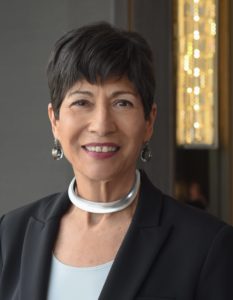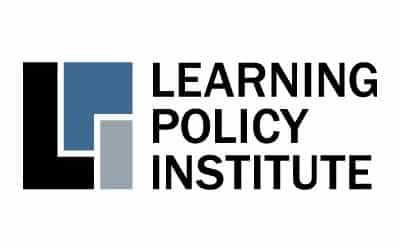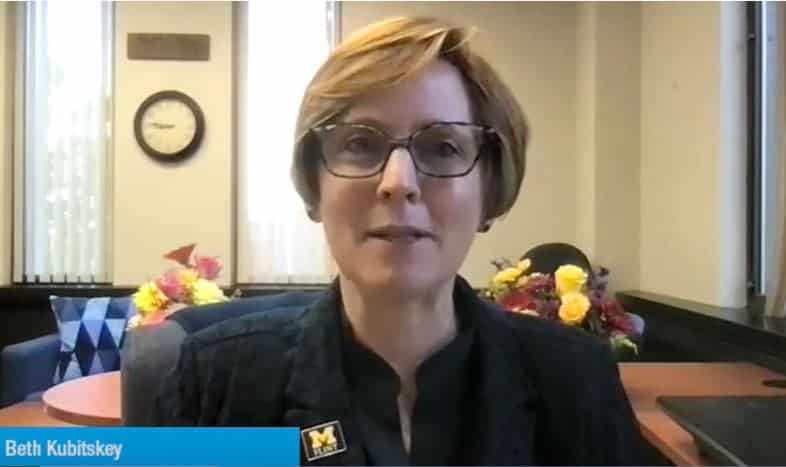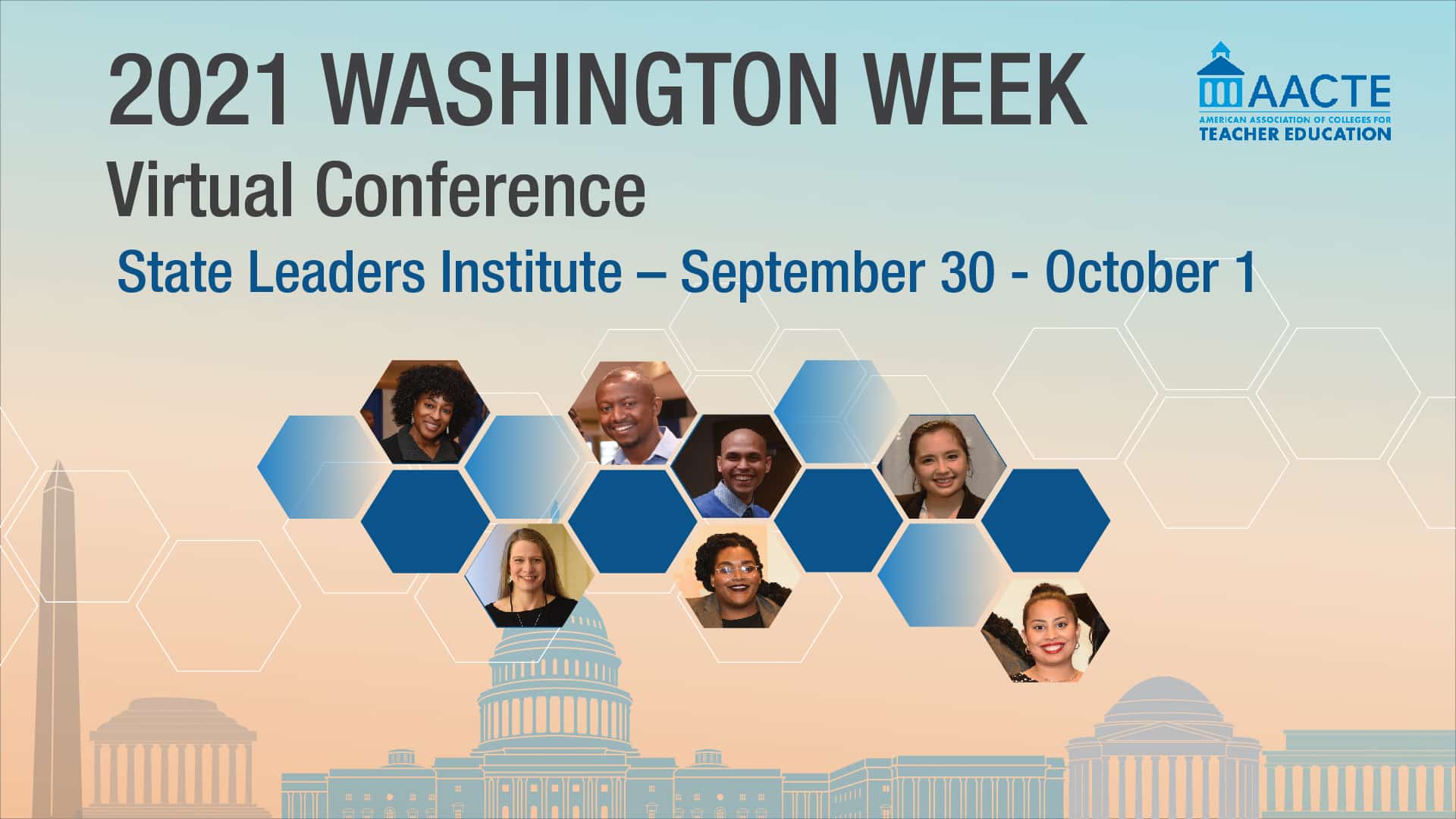19 Jul2022
By Natalie Khairallah
 As school districts prepare for the 2022-23 school year, policymakers are determined to prioritize comprehensive solutions to address staffing shortages, a long-standing issue exacerbated during the pandemic.
As school districts prepare for the 2022-23 school year, policymakers are determined to prioritize comprehensive solutions to address staffing shortages, a long-standing issue exacerbated during the pandemic.
AACTE President and CEO Lynn M. Gangone recently shared insight on this topic at a virtual session hosted by the National Governor Association’s (NGA) Community Renewal Task Force. Led by Co-chair and Missouri Governor Mike Parson, the discussion also included Penny Schwinn, Tennessee commissioner of education, and Roberto Rodriquez, assistant secretary of planning, evaluation, and policy Development at the U.S. Department of Education.
19 Jul2022
By Kaitlyn Brennan

This weekly Washington Update is intended to keep members informed on Capitol Hill activities impacting the educator preparation community. The views expressed in this post do not necessarily reflect the views of AACTE.
This week, the 87th biennial American Federation of Teachers (AFT) convention is taking place in Boston, where the city will welcome more than 3,000 members and leaders of the labor group. Today, First Lady Dr. Jill Biden will address the AFT with Labor Secretary Marty Walsh and Massachusetts Sens. Elizabeth Warren and Ed Markey scheduled to take the stage as well. The AFT convention comes as districts across the nation are beginning to prepare for a return to school in the fall while in the midst of a critical shortage of educators and specialized instructional support personnel. An all-hands-on-deck approach will be needed, which includes comprehensive, full preparation coupled with support from federal, state, and local governments in order to address this crisis.
15 Jul2022
By Anna Merod

On July 5, Arizona Gov. Doug Ducey signed a law permitting teachers to instruct in the classroom full-time without a bachelor’s degree. Stock Photo via Getty Images
This article originally appeared on K-12 Dive.
The same week Arizona Gov. Doug Ducey signed into law one of the nation’s most expansive school choice laws, he also approved a new law that would no longer require a bachelor’s degree for teaching in a classroom full time.
The legislation, SB 1159, allows people without a bachelor’s degree to start training to become a teacher while in college and finish that training while also finishing their degree.
28 Jun2022
By Natalie Khairallah
 The Council of State Governments (CSG) is partnering with the Department of Defense and the National Association of State Directors of Teacher Education and Certification to develop the Interstate Teaching Mobility Compact (ITMC) — a new interstate compact — to help offset the steep shortage of teachers across the nation.
The Council of State Governments (CSG) is partnering with the Department of Defense and the National Association of State Directors of Teacher Education and Certification to develop the Interstate Teaching Mobility Compact (ITMC) — a new interstate compact — to help offset the steep shortage of teachers across the nation.
The ITMC is a legal contract between two compact member states that will allow teachers greater mobility and more employment opportunities inside the classroom by eliminating additional licensing and testing barriers that would be typically required.
29 Mar2022
By Laura Mogelson
 I serve as the legislative liaison for the Minnesota Association of Colleges for Teacher Education (MACTE), a consortium of over 20 public and private institutions of higher education. We represent both urban and rural geographic regions and we range in size. In Minnesota, we are unique in that the governor is a democrat, the house is majority democrat, and the senate is majority republican.
I serve as the legislative liaison for the Minnesota Association of Colleges for Teacher Education (MACTE), a consortium of over 20 public and private institutions of higher education. We represent both urban and rural geographic regions and we range in size. In Minnesota, we are unique in that the governor is a democrat, the house is majority democrat, and the senate is majority republican.
Prior to the launch of the Minnesota legislative session, MACTE developed collaborative legislative priorities that guide our work with the legislature. This year our four main goals are 1) to maintain high quality teacher preparation standards and support initiatives that reflect the research base around teaching methodologies; 2) increase the diversity of the Minnesota teaching force through strategies to recruit, support, prepare, and retain teachers of color; 3) to improve the retention of teachers; and 4) to support high-quality research-based E-12 instructional practices. In my work as the liaison, I attend committee meetings and advocate our support (or opposition) to proposed legislation through written or oral testimony. I am often supported by our MACTE leadership, our faculty who are content area experts, and our teacher candidates.
28 Mar2022
By Kaitlyn Brennan
 This weekly Washington Update is intended to keep members informed on Capitol Hill activities impacting the educator preparation community. The views expressed in this post do not necessarily reflect the views of AACTE.
This weekly Washington Update is intended to keep members informed on Capitol Hill activities impacting the educator preparation community. The views expressed in this post do not necessarily reflect the views of AACTE.
We have received confirmation that the president will release his budget request on Monday, March 28 — signaling the official “kick-off” to the FY2023 appropriations season. Advocates are anxiously awaiting to see the line item requests for the Department of Education and will work diligently in the coming months to secure meaningful investments to address the critical shortage of educators and lack of diversity across the field. Stay tuned for more details to come in next week’s Washington Update.
Secretary of Education Miguel Cardona Urges LEAs to Recognize the Critical Importance of Supporting Students with Disabilities
This week, Secretary of Education Miguel Cardona sent an eight page letter to school district officials and parents urging LEAs to recognize the critical importance of supporting students with disabilities. The document comes as many districts are rolling back their COVID-19 mitigation efforts following updated guidance from the Centers for Disease Control and Prevention (CDC). The letter is intended to help school district personnel and families design learning opportunities for all students, including students with disabilities. The document reviews key strategies, including Leveraging the IEP or Section 504 Processes to Ensure Protections are In Place to Protect In-Person Learning; Continuing Use of Layered Prevention Strategies to Keep School Communities Safe; and Ensuring Students Receive Education and Services in the Least Restrictive Environment.
18 Mar2022
By Kaitlyn Brennan

This weekly Washington Update is intended to keep members informed on Capitol Hill activities impacting the educator preparation community. The views expressed in this post do not necessarily reflect the views of AACTE.
We are now hearing that the President’s budget request for fiscal year (FY) 2023 will likely be sent to Congress the last week of March or first week of April. The release of the budget signals the official “kick-off” for the FY 2023 appropriations cycle. Advocates will continue to work diligently to secure meaningful investments to support rebuilding and diversifying the special educator and specialized instructional support personnel.
Top Democratic Leaders Urge Biden Administration to Extend Student Loan Repayment Pause
Top Democratic leaders, including Senator Patty Murray (D-WA) who chairs the Senate education committee, are urging the Biden Administration to extend the moratorium on federal student loan repayments until at least the start of 2023. In a statement, Senator Murray noted the importance of fixing the “broken student loan system” and that borrowers are “struggling with rising costs, struggling to get their feet back under them after public health and economic crises, and struggling with a broken student loan system — and all this is felt especially hard by borrowers of color.”
16 Feb2022
By NCACTE Advocacy and Policy Committee, EdNC.org
This perspective, written by the North Carolina Association of Colleges for Teacher Education (NCACTE) Advocacy and Policy Committee, originally appeared on NdNC.org and is reprinted with permission.
 The purpose of this update is to provide feedback to educational partners on the North Carolina Association for the Colleges of Teacher Educator’s (NCACTE) collective perceptions of the current policy discussions related to revising the teacher licensure process in North Carolina. These proposals were originally suggested by the Human Capital Roundtable and have been reviewed over the last year by PEPSC subcommittees. This document was created by the NCACTE Advocacy & Policy Committee, almost all of whom serve on one of the subcommittees.
The purpose of this update is to provide feedback to educational partners on the North Carolina Association for the Colleges of Teacher Educator’s (NCACTE) collective perceptions of the current policy discussions related to revising the teacher licensure process in North Carolina. These proposals were originally suggested by the Human Capital Roundtable and have been reviewed over the last year by PEPSC subcommittees. This document was created by the NCACTE Advocacy & Policy Committee, almost all of whom serve on one of the subcommittees.
After spending many months in meetings, reviewing documents, and listening to feedback from all stakeholders involved, we have synthesized our thoughts here. While we believe this work has progressed, there are still several areas where we believe additional work is needed. We would like to thank PEPSC for this work and continue to offer our service as these issues evolve. We ask for the reader’s indulgence in reviewing this entire document carefully.
In our discussions, three priorities emerged (in no particular order):
09 Dec2021
By Ward Cummings
 AACTE recently launched its year-long collaboration with the Teacher Licensure Collaborative (TLC), a partnership with the Learning Policy Institute, Education Commission of the States, and additional national partners. TLC is a gathering of national organizations and interested state education institutions working to advance revisions of state licensure and certification standards in order to incorporate whole child practices and to ensure alignment with the science of learning and development.
AACTE recently launched its year-long collaboration with the Teacher Licensure Collaborative (TLC), a partnership with the Learning Policy Institute, Education Commission of the States, and additional national partners. TLC is a gathering of national organizations and interested state education institutions working to advance revisions of state licensure and certification standards in order to incorporate whole child practices and to ensure alignment with the science of learning and development.
The partnership meeting began with a welcome from Linda Darling-Hammond, Ed.D., who explained the various motivations that inspired the creation of TLC. The kickoff was an opportunity for all of the state team members to gather and learn about the collaborative’s goals and structure. A few AACTE affiliate members were among the states participating in the TLC including Ohio, Massachusetts, and North Dakota.
09 Sep2021
By Beth Kubitskey
 Beth Kubitskey, ACSR Midwest Region representative and president of the Michigan Association of Colleges for Teacher Education, recently shared her experience as a State Leaders Institute attendee and what she’s looking forward to at this year’s virtual event during Washington Week.
Beth Kubitskey, ACSR Midwest Region representative and president of the Michigan Association of Colleges for Teacher Education, recently shared her experience as a State Leaders Institute attendee and what she’s looking forward to at this year’s virtual event during Washington Week.
Why do you believe it is important for AACTE members to actively advocate for education?
One of the reasons I think it is vital for AACTE members to advocate for education is because we are the experts. Still, often we are so busy doing the work that we do, we have to remind ourselves that we need to be proactive, not reactive. Often by the time we finally receive word on a bill, law, or state policy, it has already moved through many processes.
And so, we are not aware of those kinds of things before they get to far down the road, and we lose our opportunity to have an impact. There are multiple examples of where we are more likely to succeed if we can get that information early and be proactive.
02 Sep2021
By Jerrica Thurman
Are you following highlights of the AACTE 2021 Washington Week on Facebook and Twitter at #AACTEWW21? In addition to blog posts and testimonial videos, AACTE recently released a Washington Week infographic on social media. Check it out below!
02 Sep2021
By Brian P. Yusko

Brian P. Yusko, president of the Ohio Association of Colleges for Teacher Education, provides insight into the impact the State Leaders Institute has on state leaders and affiliate members in the Q&A article.
Why do you believe it is important for AACTE members to actively advocate for education?
In our current political climate, educational policy is highly contested, with strong advocates for multiple competing goals of schooling. Many lawmakers feel comfortable proposing changes in P-12 educational policy without necessarily understanding all the implications for teacher preparation. If teacher educators are not at the table, policymakers are liable to make decisions that run counter to what we know about quality teacher education.
01 Sep2021
By Ward Cummings
AACTE recently joined the Learning Policy Institute to announce the formation of the Teacher Licensure Collaborative (TLC), a partnership of interested states building on the work of the Whole Child Policy Table, to advance revisions of state licensure and certification standards to incorporate whole child practices and ensure alignment with the science of learning and development.
Led by the Learning Policy Institute, with support of AACTE, the TLC will help advance revisions of state licensure and certification standards, incorporate whole child practices—including social and emotional learning (SEL)—and ensure alignment with the science of learning and development.
01 Sep2021
By Ward Cummings
 The Ohio Department of Education recently announced the Diversifying the Education Profession Grant Awardees, 20 school districts that will work over two and a half years to implement strategies to address the diversity needs within their faculty and staff.
The Ohio Department of Education recently announced the Diversifying the Education Profession Grant Awardees, 20 school districts that will work over two and a half years to implement strategies to address the diversity needs within their faculty and staff.
According to the Ohio Department of Education, the state has significantly more minority students than minority teachers in its public schools. Ample research shows that teachers of color help students of color perform better academically, socially, and emotionally, and the benefits translate into higher test scores, increased likeliness of staying in school, and lower likeliness of chronic absences and discipline incidents.
19 Aug2021
By Blair Mann

Leaders are grappling with the unprecedented challenge of working to understand and address the impact of the pandemic on students and communities. To support recovery, decisionmakers at all levels, from state policymakers to parents, must have access to data and use it to effectively address the challenges schools and districts face. But DQC’s 2021 public opinion polling of parents and principals uncovered considerable disconnects that could threaten efforts to use data to address the current moment and beyond.
As leaders turn their attention to the upcoming school year, data continues to be a critical tool for informing recovery efforts. State and local leaders are working together and using data to tackle the most pressing issues, which include:
 As school districts prepare for the 2022-23 school year, policymakers are determined to prioritize comprehensive solutions to address staffing shortages, a long-standing issue exacerbated during the pandemic.
As school districts prepare for the 2022-23 school year, policymakers are determined to prioritize comprehensive solutions to address staffing shortages, a long-standing issue exacerbated during the pandemic.









 I serve as the legislative liaison for the Minnesota Association of Colleges for Teacher Education (MACTE), a consortium of over 20 public and private institutions of higher education. We represent both urban and rural geographic regions and we range in size. In Minnesota, we are unique in that the governor is a democrat, the house is majority democrat, and the senate is majority republican.
I serve as the legislative liaison for the Minnesota Association of Colleges for Teacher Education (MACTE), a consortium of over 20 public and private institutions of higher education. We represent both urban and rural geographic regions and we range in size. In Minnesota, we are unique in that the governor is a democrat, the house is majority democrat, and the senate is majority republican. This weekly Washington Update is intended to keep members informed on Capitol Hill activities impacting the educator preparation community. The views expressed in this post do not necessarily reflect the views of AACTE.
This weekly Washington Update is intended to keep members informed on Capitol Hill activities impacting the educator preparation community. The views expressed in this post do not necessarily reflect the views of AACTE. 
 The purpose of this update is to provide feedback to educational partners on the North Carolina Association for the Colleges of Teacher Educator’s (NCACTE) collective perceptions of the current policy discussions related to revising the teacher licensure process in North Carolina. These proposals were originally suggested by the Human Capital Roundtable and have been reviewed over the last year by PEPSC subcommittees. This document was created by the NCACTE Advocacy & Policy Committee, almost all of whom serve on one of the subcommittees.
The purpose of this update is to provide feedback to educational partners on the North Carolina Association for the Colleges of Teacher Educator’s (NCACTE) collective perceptions of the current policy discussions related to revising the teacher licensure process in North Carolina. These proposals were originally suggested by the Human Capital Roundtable and have been reviewed over the last year by PEPSC subcommittees. This document was created by the NCACTE Advocacy & Policy Committee, almost all of whom serve on one of the subcommittees. AACTE recently launched its year-long collaboration with the Teacher Licensure Collaborative (TLC), a partnership with the Learning Policy Institute, Education Commission of the States, and additional national partners. TLC is a gathering of national organizations and interested state education institutions working to advance revisions of state licensure and certification standards in order to incorporate whole child practices and to ensure alignment with the science of learning and development.
AACTE recently launched its year-long collaboration with the Teacher Licensure Collaborative (TLC), a partnership with the Learning Policy Institute, Education Commission of the States, and additional national partners. TLC is a gathering of national organizations and interested state education institutions working to advance revisions of state licensure and certification standards in order to incorporate whole child practices and to ensure alignment with the science of learning and development. Beth Kubitskey, ACSR Midwest Region representative and president of the Michigan Association of Colleges for Teacher Education, recently shared her experience as a State Leaders Institute attendee and what she’s looking forward to at this year’s virtual event during Washington Week.
Beth Kubitskey, ACSR Midwest Region representative and president of the Michigan Association of Colleges for Teacher Education, recently shared her experience as a State Leaders Institute attendee and what she’s looking forward to at this year’s virtual event during Washington Week. 
 The Ohio Department of Education recently announced the Diversifying the Education Profession Grant Awardees,
The Ohio Department of Education recently announced the Diversifying the Education Profession Grant Awardees, 